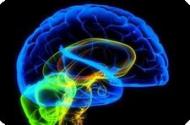
Acupuncture has a measurable effect on the brain.

The treatment of aches and pains through the ancient Chinese medicine, commonly known as acupuncture, has always been doubted by the scientists, as to whether it really works.
The BBC TV series Alternative Medicine presented an experiment by scientist Professor Kathy Sykes from Bristol University which shows that acupuncture has a measurable effect on the human brain.
The study reveals that a technique can turn off parts of the brain involved in pain, neuroscientists now seemingly believe that deep-needle acupuncture can combat pain as an anaesthetic.
The study, carried out on a set of volunteers by scientists at Hull York Medical School found that an acupuncture technique using deep needling led to the deactivaton of part of the brain's limbic system, which helps the body to be conscious of pain.
"The particular area of the brain that MRI shows deactivation for during acupuncture is part of the pain matrix which is involved in the perception of pain," The Independant quoted Professor Kathy Sykes of Bristol University, as saying.
"It helps someone decide whether something is painful or not. So it could be that acupuncture in some ways changes a person's pain threshold," Sykes added.
The study tested two forms of acupuncture on separate sets of volunteers. One involved inserting needles into the skin on the back of the hand by about a millimetre, which showed nerve activation in the motor cortex of the brain, the area that normally responds to touch or pain.
However, a measurable deactivation in the brain's limbic system was found in the brain scanning images of the group that underwent deeper needling (insertion up to a centimetre into the same pressure points). When asked about the sensation, people who experienced deep-needle acupuncture said that they felt a tingling sensation but not pain.
Mark Lythgoe, a neuroscientist at University College London said that the findings were significant because they demonstrated a physical effect on the brain.
"This may account for the way it works. This is a possible novel neurobiological mechanism for the action of acupuncture," said Dr Lythgoe. The scientists said they were used to seeing drugs or other medical treatments activating parts of the brain and they were surprised to see something that had the opposite effect.
"I'm just thrilled that we managed to do a real scientific experiment, shaped and run by scientists and acupuncturists together, where we found something quite unexpected - that acupuncture is having a measurable effect on the brain," said Professor Sykes.
The Evidence (BBC 2, 24 January 2006)
Other News




